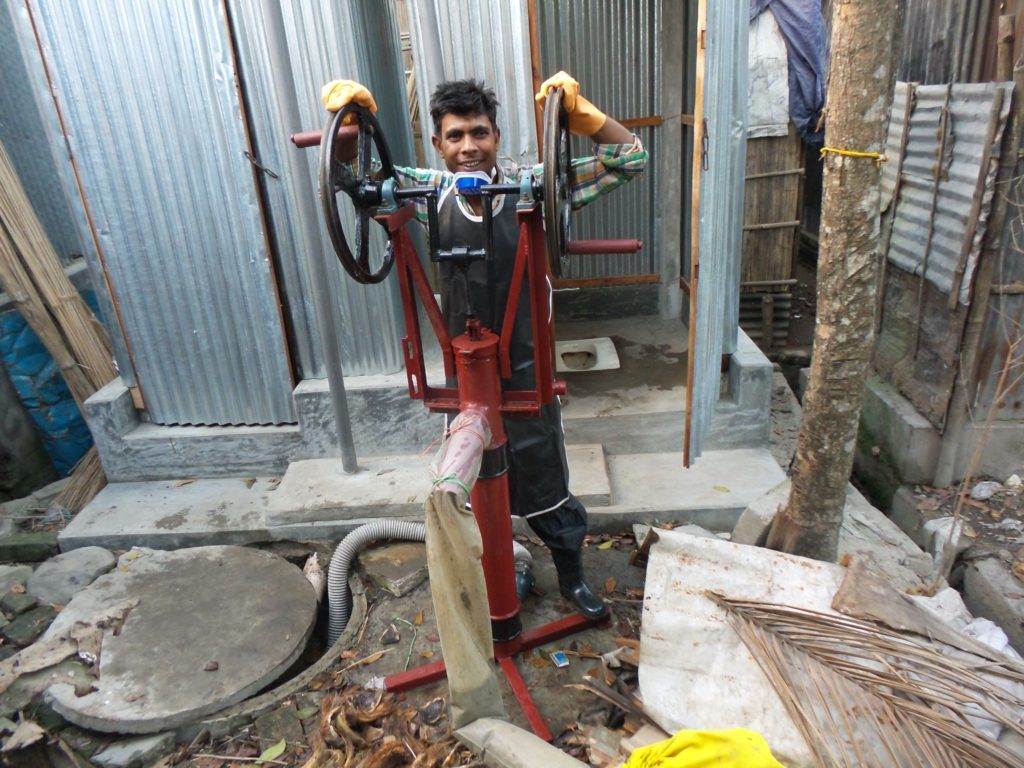People don’t like to talk about faecal waste management. But in Bangladesh, it’s the key to improving lives and the environment.
In Bangladesh, almost everyone has access to a basic toilet, but disposing of the human waste is a major problem. Often toilets overflow in the street or waste is dumped in local rivers, creating hazards to health. The infrastructure and service provision in cities is poor and the working conditions of informal pit emptiers are dangerous to their health. They are poorly paid and often socially excluded because of the nature of their work.
We’ve supported the existing informal sector groups so that they can provide efficient and effective collection and treatment services
in the city of Faridpur. These waste workers have reclaimed their dignity through better, safer working practices, and being involved with the Municipality discussions on the design, delivery and management of services.
We collaborated with local authorities and private companies to develop a simple, low-cost sewage plant and special equipment to extract waste and transport it to the plant.
Workers were given special clothing to help protect their health. Their status in the community has been boosted through the formation of a co-operative to run the waste operation on a business footing.
Influential organisations and businesses, including the World Health Organisation, joined our international network of experts to help take our solutions to more people. We welcomed students at Leeds University to carry out sanitation studies to support our work. The Government of Bangladesh has approved the Institutional and Regulatory Framework for Faecal Sludge Management and asked us and our partners to develop a plan to put it into practice.
We helped create a manual, Faecal Sludge and Septage Treatment, to share this knowledge around the world. The book is already helping large swathes of the planet to live with the dignity and convenience that so many of us take for granted – and is a prime example of the accessible practical, high impact resources we produce. We’ve distributed the manual to 99 countries and it has already been read by over 2,800 changemakers.

A pit emptier in Bangladesh. Once cultural outcasts, the people who empty the country’s latrines now finally have a say in their communities. New equipment, such as this ‘gulper’ mean that their jobs are cleaner and safer. And through participating in committees and co-operatives, they are able to influence local and national policies.
We won the Collaboration Award in the 2019 Development Awards from BOND, the UK network for organisations working in international development. This recognised the breadth and depth of our collaboration with communities, local and national government, companies and international bodies as we worked together to improve the management of human waste in Bangladesh.
“Practical Action has influenced policy, as well as organising waste workers and their protective clothing. It feels like a good example of systems influencing. The partnerships behind the work are multi-layered. Working with local government, the list of partnerships and collaboration was interesting and showed the complexity of the challenge.” Judging panel, BOND
Beating bureaucracy
In India, complications around land ownership and planning permission for sewage treatment plants have been challenging and have delayed our plans.
We have made considerable progress this year, though, with one plant serving around 50,000 people already running and two more due to open soon. The success of our work in Bangladesh is helping us to demonstrate the efficacy of our solutions to our partners in India who can help us overcome bureaucratic barriers to rolling out our work there.